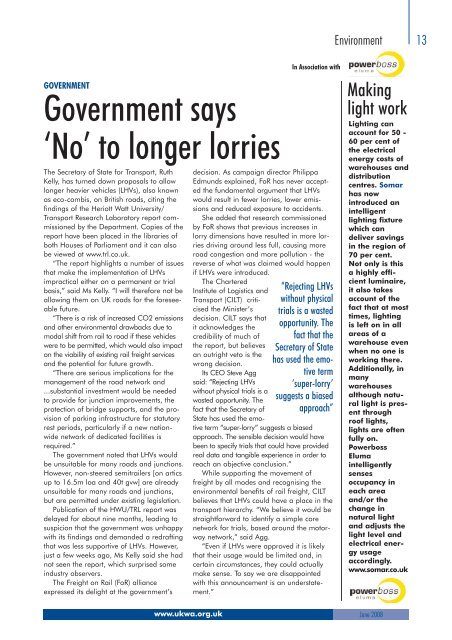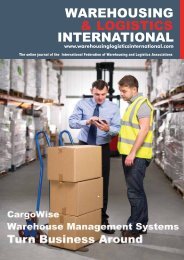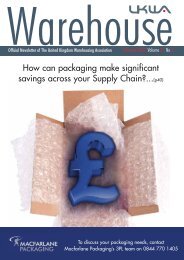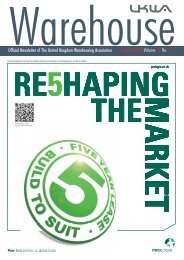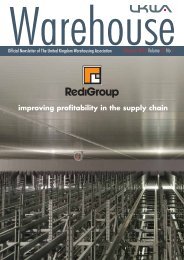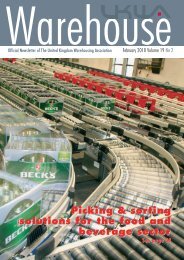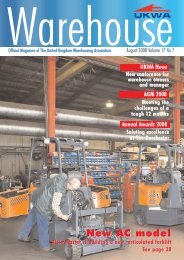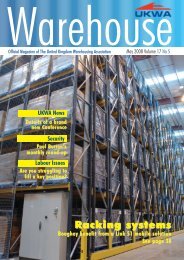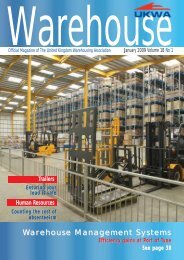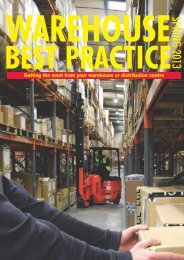UKWA FOR WEB - United Kingdom Warehousing Association
UKWA FOR WEB - United Kingdom Warehousing Association
UKWA FOR WEB - United Kingdom Warehousing Association
Create successful ePaper yourself
Turn your PDF publications into a flip-book with our unique Google optimized e-Paper software.
Environment 13<br />
GOVERNMENT<br />
Government says<br />
‘No’ to longer lorries<br />
The Secretary of State for Transport, Ruth<br />
Kelly, has turned down proposals to allow<br />
longer heavier vehicles (LHVs), also known<br />
as eco-combis, on British roads, citing the<br />
findings of the Heriott Watt University/<br />
Transport Research Laboratory report commissioned<br />
by the Department. Copies of the<br />
report have been placed in the libraries of<br />
both Houses of Parliament and it can also<br />
be viewed at www.trl.co.uk.<br />
“The report highlights a number of issues<br />
that make the implementation of LHVs<br />
impractical either on a permanent or trial<br />
basis,” said Ms Kelly. “I will therefore not be<br />
allowing them on UK roads for the foreseeable<br />
future.<br />
“There is a risk of increased CO2 emissions<br />
and other environmental drawbacks due to<br />
modal shift from rail to road if these vehicles<br />
were to be permitted, which would also impact<br />
on the viability of existing rail freight services<br />
and the potential for future growth.<br />
“There are serious implications for the<br />
management of the road network and<br />
...substantial investment would be needed<br />
to provide for junction improvements, the<br />
protection of bridge supports, and the provision<br />
of parking infrastructure for statutory<br />
rest periods, particularly if a new nationwide<br />
network of dedicated facilities is<br />
required.”<br />
The government noted that LHVs would<br />
be unsuitable for many roads and junctions.<br />
However, non-steered semitrailers [on artics<br />
up to 16.5m loa and 40t gvw] are already<br />
unsuitable for many roads and junctions,<br />
but are permitted under existing legislation.<br />
Publication of the HWU/TRL report was<br />
delayed for about nine months, leading to<br />
suspicion that the government was unhappy<br />
with its findings and demanded a redrafting<br />
that was less supportive of LHVs. However,<br />
just a few weeks ago, Ms Kelly said she had<br />
not seen the report, which surprised some<br />
industry observers.<br />
The Freight on Rail (FoR) alliance<br />
expressed its delight at the government’s<br />
In <strong>Association</strong> with<br />
decision. As campaign director Philippa<br />
Edmunds explained, FoR has never accepted<br />
the fundamental argument that LHVs<br />
would result in fewer lorries, lower emissions<br />
and reduced exposure to accidents.<br />
She added that research commissioned<br />
by FoR shows that previous increases in<br />
lorry dimensions have resulted in more lorries<br />
driving around less full, causing more<br />
road congestion and more pollution - the<br />
reverse of what was claimed would happen<br />
if LHVs were introduced.<br />
The Chartered<br />
Institute of Logistics and<br />
Transport (CILT) criticised<br />
the Minister’s<br />
decision. CILT says that<br />
it acknowledges the<br />
credibility of much of<br />
the report, but believes<br />
an outright veto is the<br />
wrong decision.<br />
Its CEO Steve Agg<br />
said: “Rejecting LHVs<br />
without physical trials is a<br />
wasted opportunity. The<br />
fact that the Secretary of<br />
State has used the emotive<br />
term “super-lorry” suggests a biased<br />
approach. The sensible decision would have<br />
been to specify trials that could have provided<br />
real data and tangible experience in order to<br />
reach an objective conclusion.”<br />
While supporting the movement of<br />
freight by all modes and recognising the<br />
environmental benefits of rail freight, CILT<br />
“Rejecting LHVs<br />
without physical<br />
trials is a wasted<br />
opportunity. The<br />
fact that the<br />
Secretary of State<br />
has used the emotive<br />
term<br />
‘super-lorry’<br />
suggests a biased<br />
approach”<br />
believes that LHVs could have a place in the<br />
transport hierarchy. “We believe it would be<br />
straightforward to identify a simple core<br />
network for trials, based around the motorway<br />
network,” said Agg.<br />
“Even if LHVs were approved it is likely<br />
that their usage would be limited and, in<br />
certain circumstances, they could actually<br />
make sense. To say we are disappointed<br />
with this announcement is an understatement.”<br />
Making<br />
light work<br />
Lighting can<br />
account for 50 -<br />
60 per cent of<br />
the electrical<br />
energy costs of<br />
warehouses and<br />
distribution<br />
centres. Somar<br />
has now<br />
introduced an<br />
intelligent<br />
lighting fixture<br />
which can<br />
deliver savings<br />
in the region of<br />
70 per cent.<br />
Not only is this<br />
a highly efficient<br />
luminaire,<br />
it also takes<br />
account of the<br />
fact that at most<br />
times, lighting<br />
is left on in all<br />
areas of a<br />
warehouse even<br />
when no one is<br />
working there.<br />
Additionally, in<br />
many<br />
warehouses<br />
although natural<br />
light is present<br />
through<br />
roof lights,<br />
lights are often<br />
fully on.<br />
Powerboss<br />
Eluma<br />
intelligently<br />
senses<br />
occupancy in<br />
each area<br />
and/or the<br />
change in<br />
natural light<br />
and adjusts the<br />
light level and<br />
electrical energy<br />
usage<br />
accordingly.<br />
www.somar.co.uk<br />
www.ukwa.org.uk June 2008


